
The Liberal Party was one of the two major political parties in the United Kingdom, along with the Conservative Party, in the 19th and early 20th centuries. Beginning as an alliance of Whigs, free trade–supporting Peelites, and reformist Radicals in the 1850s, by the end of the 19th century, it had formed four governments under William Ewart Gladstone. Despite being divided over the issue of Irish Home Rule, the party returned to government in 1905 and won a landslide victory in the 1906 general election. Under prime ministers Henry Campbell-Bannerman (1905–1908) and H. H. Asquith (1908–1916), the Liberal Party passed reforms that created a basic welfare state. Although Asquith was the party leader, its dominant figure was David Lloyd George.

Nonconformists were Protestant Christians who did not "conform" to the governance and usages of the established church in England, and in Wales until 1914, the Church of England.
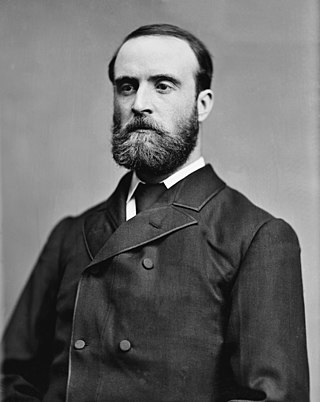
Charles Stewart Parnell was an Irish nationalist politician who served as a Member of Parliament (MP) in the United Kingdom from 1875 to 1891, Leader of the Home Rule League from 1880 to 1882, and then of the Irish Parliamentary Party from 1882 to 1891, who held the balance of power in the House of Commons during the Home Rule debates of 1885–1886. He fell from power following revelations of a long-term affair, and died at age 45.
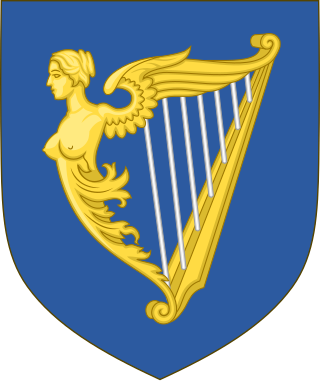
The Irish Parliamentary Party was formed in 1874 by Isaac Butt, the leader of the Nationalist Party, replacing the Home Rule League, as official parliamentary party for Irish nationalist Members of Parliament (MPs) elected to the House of Commons at Westminster within the United Kingdom of Great Britain and Ireland up until 1918. Its central objectives were legislative independence for Ireland and land reform. Its constitutional movement was instrumental in laying the groundwork for Irish self-government through three Irish Home Rule bills.

The Unionist Party was the main centre-right political party in Scotland between 1912 and 1965.

The 1892 United Kingdom general election was held from 4 to 26 July 1892. It saw the Conservatives, led by Lord Salisbury again win the greatest number of seats, but no longer a majority as William Ewart Gladstone's Liberals won 80 more seats than in the 1886 general election. The Liberal Unionists who had previously supported the Conservative government saw their vote and seat numbers go down.

The 1874 United Kingdom general election saw the incumbent Liberals, led by William Gladstone, lose decisively, even though their party won a majority of the votes cast. Benjamin Disraeli's Conservatives won the majority of seats in the House of Commons, largely because they won a number of uncontested seats. It was the first Conservative victory in a general election since 1841. Gladstone's decision to call an election surprised his colleagues, for they were aware of large sectors of discontent in their coalition. For example, the nonconformists were upset with education policies; many working-class people disliked the new trade union laws and the restrictions on drinking. The Conservatives were making gains in the middle-class, Gladstone wanted to abolish the income tax, but failed to carry his own cabinet. The result was a disaster for the Liberals, who went from 387 MPs to only 242. Conservatives jumped from 271 to 350. Gladstone himself noted: "We have been swept away in a torrent of gin and beer".
Disestablishmentarianism is a movement to end the Church of England's status as an official church of the United Kingdom.

The Representation of the People Act 1867, known as the Reform Act 1867 or the Second Reform Act, is an act of the British Parliament that enfranchised part of the urban male working class in England and Wales for the first time, extending the franchise from landowners of freehold property above a certain value, to leaseholders and rental tenants as well. It took effect in stages over the next two years, culminating in full commencement on 1 January 1869.
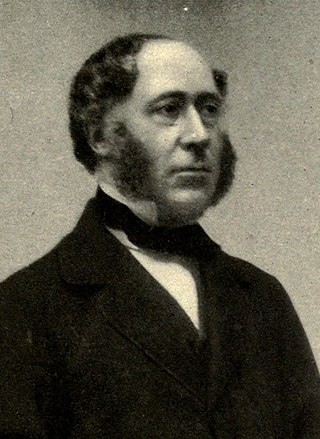
George Henry Moore was an Irish politician who, in the 1850s, was a co-founder of the Tenant Right League, of the Catholic Defence Association and, as the Member for Mayo in the United Kingdom Parliament, of the Independent Irish Party. Although an advocate of tenant rights, and renowned for his relief efforts during the Great Famine, at the time of his death in 1870 Moore was defending his rights as a landowner against an oath-bound tenant society, the Ribbonmen. He was the father of the novelist George Augustus Moore and of the Fianna Fáil Senator Maurice George Moore.
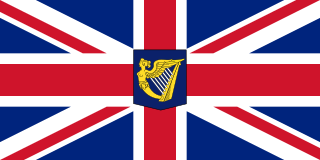
Ireland was part of the United Kingdom from 1801 to 1922. For almost all of this period, the island was governed by the UK Parliament in London through its Dublin Castle administration in Ireland. Ireland underwent considerable difficulties in the 19th century, especially the Great Famine of the 1840s which started a population decline that continued for almost a century. The late 19th and early 20th centuries saw a vigorous campaign for Irish Home Rule. While legislation enabling Irish Home Rule was eventually passed, militant and armed opposition from Irish unionists, particularly in Ulster, opposed it. Proclamation was shelved for the duration following the outbreak of World War I. By 1918, however, moderate Irish nationalism had been eclipsed by militant republican separatism. In 1919, war broke out between republican separatists and British Government forces. Subsequent negotiations between Sinn Féin, the major Irish party, and the UK government led to the signing of the Anglo-Irish Treaty, which resulted in five-sixths of the island seceding from the United Kingdom, becoming the Irish Free State, with only the six northeastern counties remaining within the United Kingdom.

The Welsh Church Act 1914 is an Act of Parliament under which the Church of England was separated and disestablished in Wales and Monmouthshire, leading to the creation of the Church in Wales. The Act had long been demanded by the Nonconformist community in Wales, which composed the majority of the population and which resented paying taxes to the Church of England. It was sponsored by the Liberal Party and opposed by the Conservative Party.
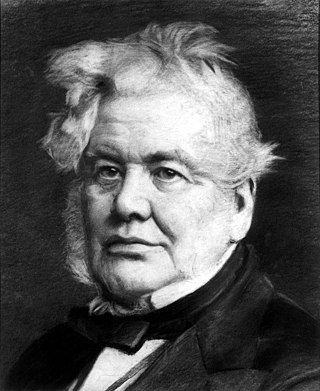
The 1874 United Kingdom general election in Ireland produced the first major electoral appearance of the Home Rule League under chairman Isaac Butt. The party's electoral success, in which it won 60 MPs, taking control of Irish electoral politics from the previously dominant Conservative and the Liberal parties was, the beginning of a dominance that was to see the party as the Irish Parliamentary Party control the political landscape in Ireland until its wipeout in the 1918 general election.

The Redistribution of Seats Act 1885 was an Act of the Parliament of the United Kingdom. It was a piece of electoral reform legislation that redistributed the seats in the House of Commons, introducing the concept of equally populated constituencies, a concept in the broader global context termed equal apportionment, in an attempt to equalise representation across the UK. It mandated the abolition of constituencies below a certain population threshold. It was associated with, but not part of, the Representation of the People Act 1884.
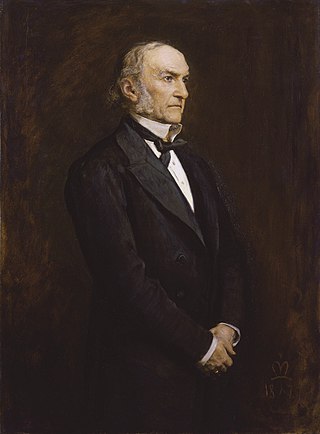
Gladstonian liberalism is a political doctrine named after the British Victorian Prime Minister and Liberal Party leader William Ewart Gladstone. Gladstonian liberalism consisted of limited government expenditure and low taxation whilst making sure government had balanced budgets and the classical liberal stress on self-help and freedom of choice. Gladstonian liberalism also emphasised free trade, little government intervention in the economy and equality of opportunity through institutional reform. It is referred to as laissez-faire or classical liberalism in the United Kingdom and is often compared to Thatcherism.
The Irish Conservative Party, often called the Irish Tories, was one of the dominant Irish political parties in Ireland in the 19th century. It was affiliated with the Conservative Party in Great Britain. Throughout much of the century it and the Irish Liberal Party were rivals for electoral dominance among Ireland's small electorate within the United Kingdom of Great Britain and Ireland, with parties such as the movements of Daniel O'Connell and later the Independent Irish Party relegated into third place. The Irish Conservatives became the principal element of the Irish Unionist Alliance following the alliance's foundation in 1891.
The Hawarden Kite was a famous British newspaper scoop of December 1885, revealing that Liberal Party leader and Leader of the Opposition William Ewart Gladstone now supported home rule for Ireland. It was an instance of "kite-flying", made by Gladstone's son Herbert, who often served as his father's secretary. It was given to Edmund Rogers of the National Press Agency in London. The statement was accurate but it is unknown whether the father knew and approved of releasing it to the press. The bombshell announcement resulted in the fall of Lord Salisbury's Conservative government. Irish Nationalists, led by Charles Parnell's Irish Parliamentary Party, held the balance of power in Parliament. Gladstone's conversion to home rule convinced them to switch away from the Conservatives and support the Liberals using the 86 seats in Parliament they controlled.

William Johnston was an Irish Orangeman, unionist and Member of Parliament for Belfast, distinguished by his independent working-class following and commitment to reform. He first entered the United Kingdom Parliament as an Irish Conservative in 1868, celebrated for having broken a standing ban on Orange Order processions and as the nominee of an association of "Protestant Workers". At Westminster, Johnston supported the secret ballot; the accommodation of trade unions and strike action; land reform; and woman's suffrage. He was succeeded in 1902 as the MP for South Belfast, by Thomas Sloan, similarly supported by loyalist workers in opposition to the official unionist candidates favoured by their employers.

The Home Rule movement was a movement that campaigned for self-government for Ireland within the United Kingdom of Great Britain and Ireland. It was the dominant political movement of Irish nationalism from 1870 to the end of World War I.
The issue of Ireland has been a major one in British politics, intermittently so for centuries. Britain's attempts to control and administer the island, or parts thereof, have had significant consequences for British politics, especially in the 19th and 20th centuries. Although nominally autonomous until the end of the 18th century, Ireland became part of the United Kingdom of Great Britain and Ireland in 1801.

















